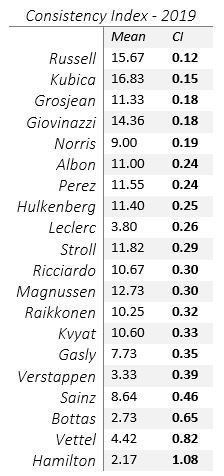Hi guys and girls..
I was doing some thinking last night regarding consistency levels of the drivers, mainly that of Verstappen and Hamilton. My observation through these forums and social media has been that generally the consensus points to Max as being the more consistent driver over the 2019 season thus far. However, we typically just point to this race and that race etc, to try and make our case. From this I remembered an article I read about cricket, where the writer had used mean and standard deviation to calculate a consistency index (CI); a metric which was used to measure how consistently a batsman performs relative to their average. I tried to draw up these same calculations for the 20 Formula One drivers so far in the 2019 season (it's not perfect!)
Basically, I used the finishing positions of all the drivers to determine their average for the season, but omitted races where drivers weren't classified. So for example, Germany wasn't included in my calculation for Bottas given he wasn't classified, however Sainz' 19th in Bahrain was, as he was classified despite not finishing the Grand Prix. The following are my findings:
As can be seen, I've ordered drivers from most to least inconsistent, where the closer to 0.00 a CI is, the more consistent the driver is considered to be. I admit that I was quite surprised that this metric points to Hamilton as being the most consistent of the lot, but we are all quite aware there are some variables at play. So before getting into that, it's worth pointing out that there are some more definitive cases in the table.
Evidently one's CI will be affected by their mean finishing position; the Williams drivers are a good example of this. The car is rubbish, and thus it is difficult to finish higher up the field than they have done, hence the standard deviation (the difference between any given finishing position, and the mean) will be minimal, creating a low CI. However, if we look at the table from a team-by-team basis, we can determine that a driver who has both a higher mean finishing position and a lower CI is in fact having the better season. This applies to four drivers in Russell, Grosjean, Perez and Leclerc, who all are not only finishing on average higher up the order than their teammate, but also doing so with greater consistency. Things become murky for the remainder of the teams, where one driver will tout a higher average finishing position, but also a higher CI. Are there any sound conclusions we can draw from the six teams that remain?
McLaren and Red Bull provide the two best examples where we can draw conclusions by interpreting the data objectively. At McLaren, Norris' CI is 0.19, compared to 0.46 for Sainz. The young Englishman has a bit of a consistency advantage over Sainz (perhaps owing to the aforementioned Bahrain classification), while Sainz just pips him in mean finishing position; scoring 8.64 to Norris' 9.00. We may conclude that Norris is effectively having the better season, given how marginal the difference in average finishing position is.
Further, in the case of Red Bull, Max' mean finishing position of 3.33 (amusing number, considering) bests Gasly's of 7.73, considerably. Meanwhile, the CI for each is split by just 0.04 in favour of Gasly. It is very easy to conclude that Max is having the better season, and is more consistently yielding strong results (we didn't need the data for this).
But what about Renault, Toro Rosso, Alfa and Mercedes? What of their numbers? I'm curious to see how other posters interpret this data. The analysis is fairly new to me, so perhaps questions need to be asked to just how consistent a CI of 0.12 is, and how inconsistent is 1.08? Let's see what people can come up with, shall we? ![]() (thanks for reading, I've been at the pub)
(thanks for reading, I've been at the pub)

























